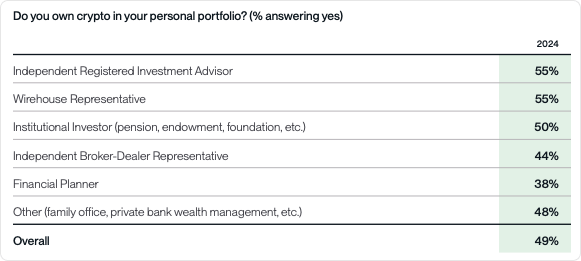What your financial advisor is (not) telling you?
How Bitcoin became the financial industry’s dirty little secret

New financial year, new you. Your personal to-do-list says it’s time to get your finances sorted… So you book a coffee with your financial advisor and she spends an hour going over your finances, the different types of assets and funds you can invest in and your goals and risk appetite.
Crypto was only briefly glossed over as part of a long list of possible investments. Once you have both finished coffee, you ask her if she owns any crypto. "Plenty!" is the reply…so why isn't she talking to you about it?
Do as I say, not as I do…
Turns out, stories like this aren’t far-fetched - not in the US and in our experience, not in New Zealand either. In fact, a recent Bitwise study confirmed the worst - financial advisors are happily investing their own funds in crypto, but not their clients’ funds…
Although circa half of financial advisors own crypto as part of their own portfolio, only 22% of them were making any client allocation to crypto. And of the other 78% of financial advisors who hadn’t allocated client funds to crypto, only 18% of them lean towards doing so (at some point).
(If you’re a financial advisor, it's probably worth pointing out that 71% of your clients are invested in crypto individually. Your clients are literally bypassing you; and if you don’t add value in this area, the writing may well be on the wall.)
So - if your financial advisor isn’t giving you advice on how to structure your portfolio to include crypto, what should you do?
Consider getting a new financial advisor who gets it
Ask yourself: If the person giving you financial advice isn’t talking to you about the best performing asset over the last decade, are they doing right by you?
Consider moving away from financial advisors and going it alone
his is what appears to be happening… in droves!

Fig 3. Bitwise study - percentage of clients who invest in crypto on their own.

Advising on crypto already?
Submit your info and be listed on Easy Crypto?
What’s stopping your financial advisor from, well, advising?
The answer is two little words with big implications: volatility and regulation. Incidentally, these often put individual investors off as well.

Let's start with volatility which unfortunately has a bad name in this part of the world. Financial advisors don’t like it because when portfolio values go down, they have to have tough conversations. Time horizons are often forgotten and essentially, they get the blame for “giving bad advice”. Investors will also often take drastic action in response to volatility. We saw this in New Zealand over Covid when people experienced a fall in their Kiwisaver portfolios and responded by taking all the risky, ‘volatile’ assets out (by moving from ‘Aggressive’ funds to ‘Conservative’, for instance).
The downside of this approach is that without those types of allocations, your returns are hobbled. And if you aren’t beating inflation, you are going backwards in real terms. If, conversely, we think about some level of volatility and risk as a positive, then this opens up a whole new way to get ahead. Sometimes - it's just about zooming out, as short and long term charts will often demonstrate.
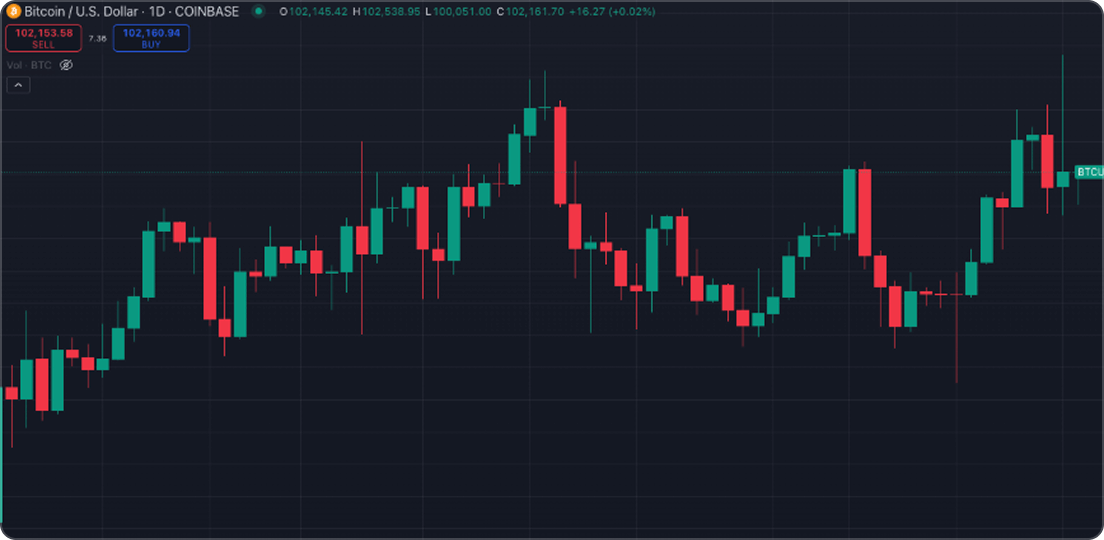
Fig 4. The Bitcoin Daily Chart (TradingView) since mid December 2024 is choppy.
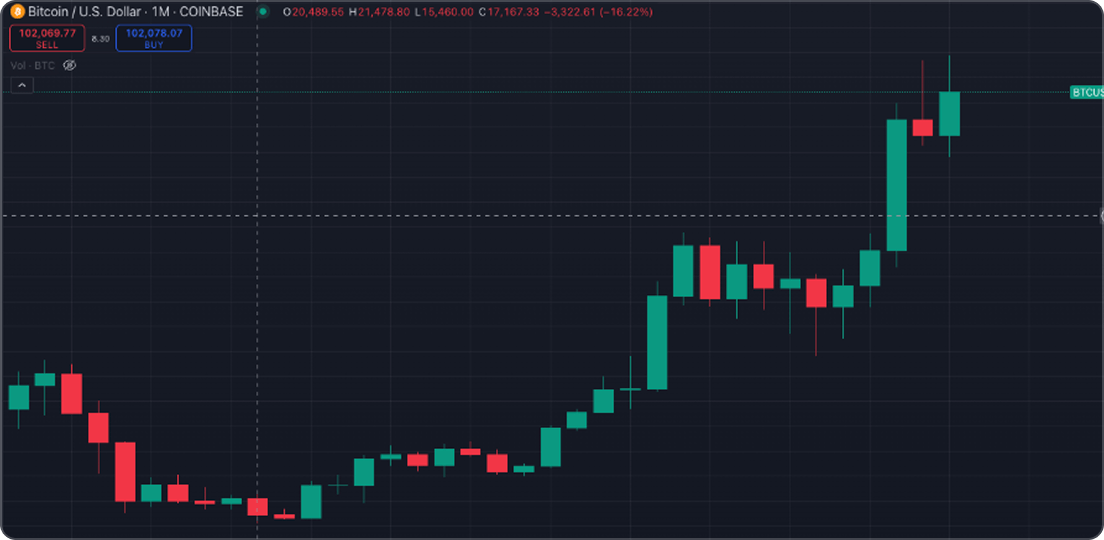
Fig 5. The Bitcoin Monthly Chart (TradingView) since 2022 paints a different picture.
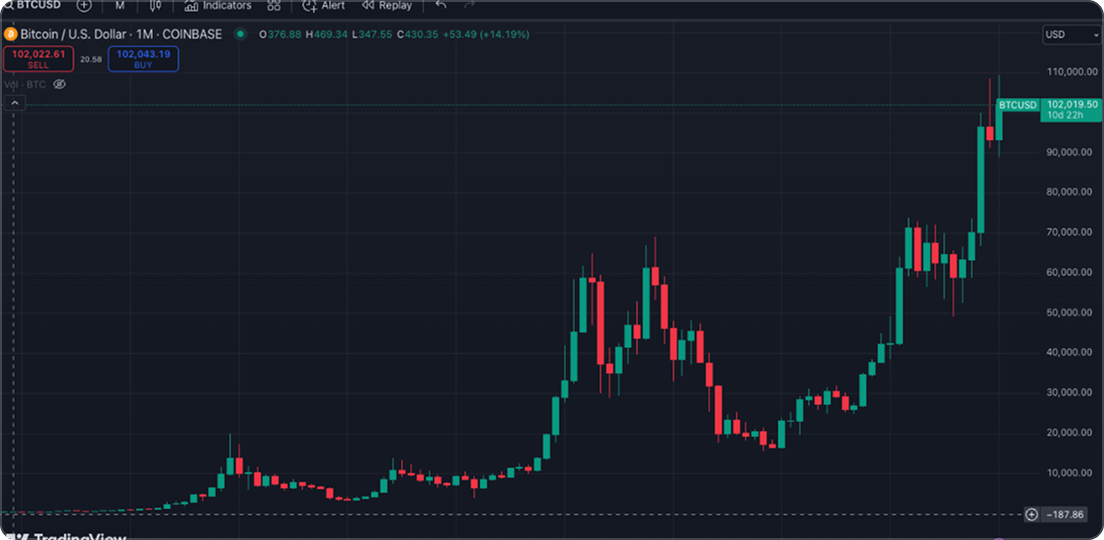
Fig 6. The Bitcoin Monthly Chart (TradingView) since 2016 shows a picture of an asset that is trending upwards over time.
Investment time horizons are important. The research is clear - holding assets over a long period of time tends to outperform short-term trading. Bitcoin and crypto are volatile, but over a decent (five year) time horizon, the trend has been up and to the right.
Volatility also brings opportunity. Bitcoin is volatile, however since 2020, most of the volatility has been positive. That is - prices have trended upwards.
Volatility also presents opportunities as investors can purchase assets at lower prices during market dips. This benefits investors when they Dollar-Cost Average as well as it enables investors to lower the average cost per coin over time.
Higher volatility can also open the door to potentially higher returns. Detailed research by Protocol Theory and Easy Crypto from last year showed that younger people are looking for higher-growth assets because they are locked out of the housing market. And interestingly, older people are looking to supercharge their retirement savings with some riskier plays to maximise their returns. In a nutshell, these groups appreciate the volatility, especially when it’s on the upside.
Regulation has also held a lot of advisors back. Rupert Carlyon from Kōura Wealth who is a pioneer in integrating crypto into Kiwisaver funds explains that

Rupert Carlyon
from Kōura Wealth
“It’s a huge concern for advisors because any advice they give needs to be well researched, typically relying on research from large investment houses either in New Zealand or offshore. If you can’t use that research to clearly show that it was in the client’s best interests to recommend investing in a product, you open yourself up to regulatory pressure if you get a complaint. Lots of advisors understand and believe in crypto, but regulation and reticence from the large global investment firms prevents them from feeling they can openly and confidently advise on it.”
Finally, it would do everyone a disservice not to mention compensation. Because investors can buy crypto products directly, this challenges the commission-based revenue model of some financial advisors. Financial advisors are going to have to adapt! (Note: some have already done so! We know that Darcy Ungaro charges for coaching and a flat hourly rate for his services.)
Really, the only logical thing for an investor to conclude is that they need some crypto in their life. When their advisors fail them, it is no surprise that investors take things into their own hands. Now, it’s becoming a case of ‘Doing what they do, not what they say…’
WAIT - before you hit ‘buy’…
But, if you are going to get into crypto alone (sans advisor), you should ‘do your own research’ (DYOR). DYOR is a mantra those who have experience in crypto can continually be heard lamenting and advising. But, sadly, most investors simply never bother.
If that’s you - don’t worry - we’ve done it for you, below!


Great gains; over time
Bitcoin is the best performing asset of the last decade (see Charlie Bilello of Creative Planning’s graph below). And it's not just Bitcoin. The S&P Cryptocurrency Broad Digital Market Index was launched in July 2021 and it is up 826% since inception, or 88% annualised (see Fig. 7). Only one asset beats that on an annual basis - Bitcoin.
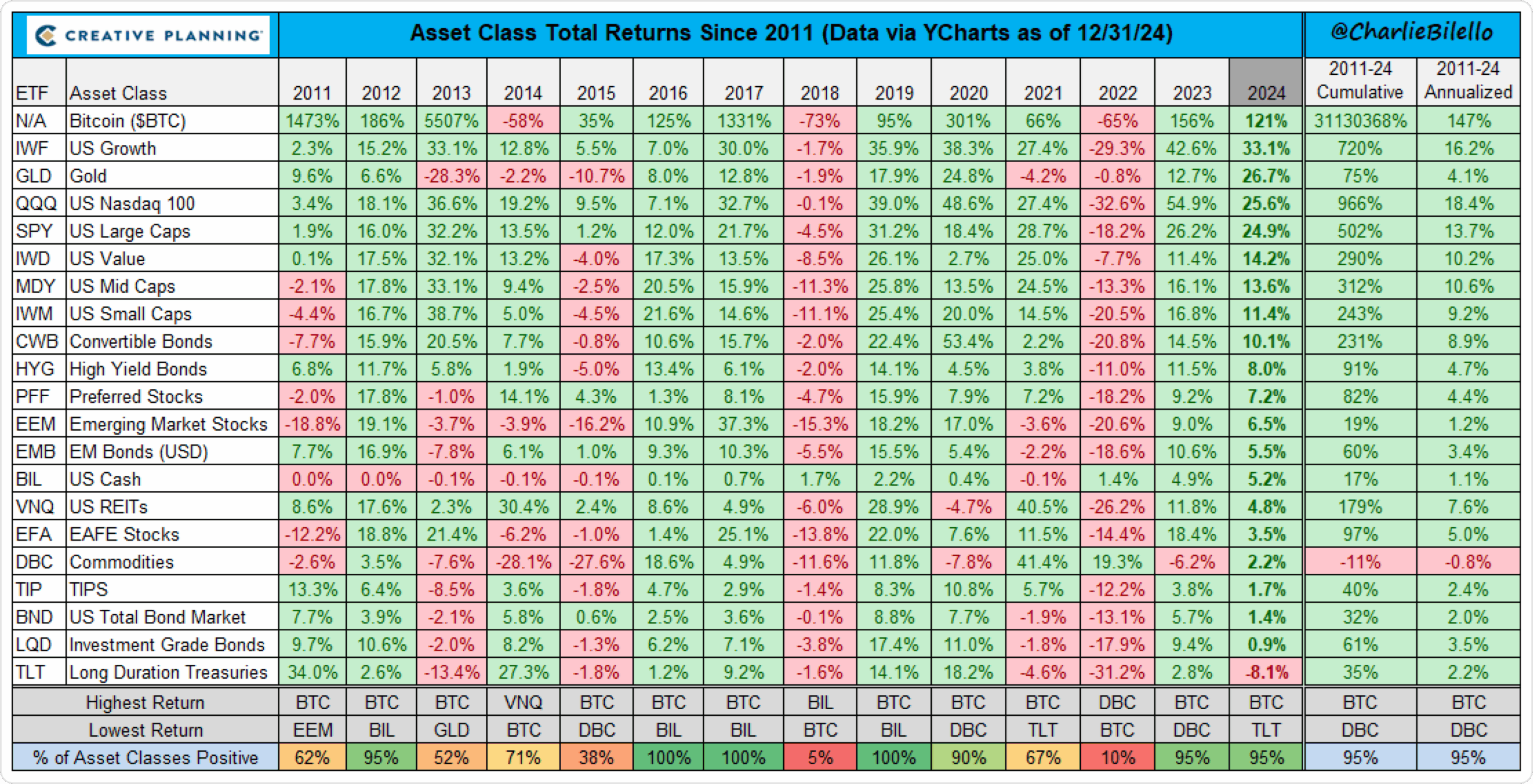
Fig 7. Total returns by asset class (Creative Planning).
But those gains aren’t in a straight line..
It is also wise to understand the impact of Bitcoin on a portfolio because there is more to it than ‘up, up and away…’
Firstly, Bitcoin often zigs when everything else zags. This is laymen's speak for Bitcoin being largely uncorrelated with other assets. Even conservative research houses that talk about the risk of volatility recognise Bitcoin as uncorrelated. Being uncorrelated helps a lot to even out the top line of a diversified portfolio.
“When designing a robust investment portfolio, one of the main goals is to achieve diversification through assets with low or negative correlation. This simply means when one asset class is performing well, another might be flat or even declining in value, thereby balancing the overall risk of the portfolio. Ironically, when your goal is to maximise returns whilst minimising risk, Bitcoin can actually make a KiwiSaver portfolio less volatile!
Many traditional financial assets, such as stocks and bonds, have a low correlation with Bitcoin. This means that when a small amount of Bitcoin is added to a KiwiSaver portfolio, it can help reduce some of the inevitable ups and downs of market cycles,” adds Rupert.

Fig 8. Bitcoin’s correlation with traditional assets (SPglobal.com).
What about risk?
Warning - stand by for a bit of financial jargon. Owning Bitcoin can significantly affect your Sharpe ratio. What is a Sharpe Ratio? In short, it evaluates the return of an investment relative to the amount of risk taken to achieve that return. Simply put: do the returns justify the risk? It’s no surprise that Bitcoin has a strongly positive Shape Ratio (0.96). (Fidelity says so).
In short, because Bitcoin has a low correlation with other assets and has a good Sharpe Ratio value, having some in your portfolio can lift your returns substantially, without increasing the volatility of your entire portfolio. (See some research on this here.)
Ready to take the next step?
(A quick obligatory disclaimer: Crypto is volatile and carries risks. Past performance doesn’t guarantee future returns. Always do your research and proceed with caution - especially if you skipped ahead to this part.)
If you’re ready, remember that you can start slowly or jump straight in. It’s up to you!
Investor types we see at Easy Crypto include three broad archetypes:
The heavy risk-takers
High-risk, high-reward enthusiasts who deeply understand crypto. This is not recommended for beginners.
The committed enthusiasts
Balanced investors with a significant crypto allocation of their total wealth (10-30%) alongside other assets. They are quiet believers in the sector’s future.
The cautious newcomers
Beginners adding crypto to diversify, typically allocating 3-6% of their portfolio (e.g., $300-600 in a $10k portfolio). This is a solid starting point.
Regardless of your investor 'personality' type, remember - your portfolio isn’t static. Regular reviews and rebalancing are key. You can adjust your allocation anytime based on your portfolio,cash flow and risk appetite.
Today, accessing crypto is easy:

Easy Crypto
We offer a secure, fast onboarding experience for Kiwis, plus tools, education and simplicity.

Other platforms
Be mindful of credit card and withdrawal fees - do your research and check reviews.

ETFs
Nervous about diving in? ETFs can be a starting point, but remember, you’re paying someone else to manage your crypto.
What about KiwiSaver?
You could also consider KiwiSaver providers like Kōura Wealth that include crypto options in their portfolios.
For financial advisors
If you recommend crypto to clients, thank you! We’re compiling a list of advisors we endorse. Want to join? Fill out the form below to be added to our approved list.
" " indicates required fields

